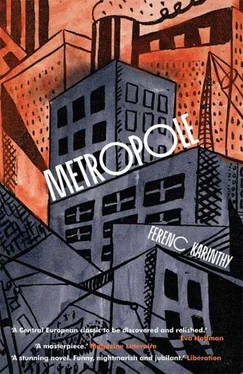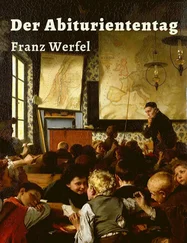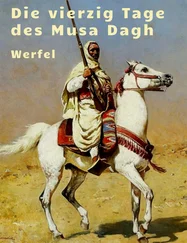They stole through the ruins as far as the first crossroads that ran to one side of the grey house to the left of the main elevation. On the opposite side there rose a modern, light-coloured round building like a tower and they ran into it. Inside, a spiral ramp some four or five metres in diameter led up to plateaus on various levels, each packed with ten to twelve cars. It was a multi-storey car park, a light construction into which many cars could fit, though currently there was no-one going in or out. There was a large mass of men there too, armed, like themselves. The battle had spread over the whole district. They were firing from windows using the barriers to the ramp, the parked cars, or anything else they could find as cover.
Budai and the youth made their way up the inner edge of the spiral ramp a little back from the firing positions, then up an extra set of stairs. Gunmen had set themselves up there too as best they could. There were ammunitions dumps, relays, notices written in various hands, arrows pointing out directions, even some first-aid stations in the corners for the wounded. The youth in the green tracksuit top briefly consulted with various individuals, then directed them to the top, floor and beyond that into the roof, vaulted with a series of wave-like forms, from which opened a series of what might have been tiny, circular air vents overlooking the street. From here, they could shoot down at the roof of the building opposite.
The silent ape-faced girl immediately took up one of the positions and began firing.
Also in their company were the young man who had earlier been slapped across the face and the man with the leather jacket and droopy moustache. Just as familiar was the fireman in his red helmet and one of the convicts. This little improvised group was joined by a few uniformed troops in tunics who had transferred their loyalty and some nine or ten civilians with rifles or machineguns who had attached themselves to the cause somewhere along the way. There was another woman there too, a stout, older black woman who was unarmed, her face wreathed in an enormous permanent happy smile. There was no argument about who was the leader, it was the blond young man in the green tracksuit top. He directed operations with a confidence that exuded authority and gave each one of them their specific tasks.
They spent the whole afternoon and evening up in the roof firing at the grey building opposite. Having had no experience of such things Budai was shown how to use and recharge his revolver. Most of the time he was firing bullets blindly with no great sense of purpose. The enemy had in any case withdrawn from the windows on the far side, reappearing only for the odd second to take better aim but still kept up a constant exchange. The chances were that there were a great many of them too, and probably just as mixed a company as was to be found on this side — it was not a battle between ethnic groups.
So many other things happened that evening it was hard to tell where one stopped and the other started. They fired and rested and fired again from different vents. Food was brought, a cauldron of soup a little like goulash, slightly sweet, with herbs and bits of meat. There were also loaves of black bread that normally served as military rations. Later, one of their number, a young man in a raincoat, was wounded and suddenly fell back, his face gone pale. He made no noise but you could see from his tight lips and desperate looks that he was in pain. He was taken away on a stretcher.
Budai managed to sleep for a couple of hours. They had created a temporary resting place out of bits of polystyrene in a corner of the loft. The crazy girl seemed to be close to him as he slept, at least from time to time. She did not address him — no one ever heard her speak, she might have been genuinely dumb — she just fixed him with a blank look that was plainly insolent, leaning on her elbow next to him, never without her machinegun. What did she want from him? She made Budai nervous even when he was half-asleep: he felt tense and anxious not knowing why she was there. How come they had been thrown together like this? What had he to do with a half-wit of the underclass? Later it seemed she was holding him in her arms, embracing him closely with a shameless sexual pleasure though he was all the time as aware of the foul smell of her perspiration as of the battle going on outside. He was also frightened of the severe youth in the green tracksuit top. What would he do if he caught them in this dim corner? It was of course possible that he was imagining all this, that it was an illusion based on acute anxiety. Later still an enormous explosion shook the loft, perhaps a bomb or a grenade — or was that hallucination too?
The evidence suggested it was no hallucination for when they left the multi-storey car park at first light of dawn and looked back, they could see that the wall had gaping holes in it and that the cars parked there had been more or less shot to pieces. The grey building opposite was in a still worse condition with what might have been tank damage: a wide crack ran across the elevation and one corner had collapsed right up to the fourth floor. There were a lot fresh scars and holes.
The little group found its way back to the front gate of the grey building. That obviously had been the chief point of the attack. The burnt-out turret of the tank that had been guarding it was lying on its side and the tracks of the vehicle had become detached, half twisted off. The most daring attackers now used it as cover, firing from behind it, then put their weights to the great mass of steel and with an enormous effort and loud cries pushed it ahead of them for use as a battering ram, thinking to break down the gate which was barred and bolted but shot full of holes now and therefore buttressed on the inside with sandbags, struts and beams.
It did not give easily: they had to shove the great armoured tank against it ten or fifteen times with constant encouragement and a deal of shouting. The thick iron doors kept bowing and bending but they always sprang back. Then the assailants started throwing grenades at it so the whole thing creaked and shrieked and was covered in smoke until finally they succeeded in loosening it from its hinges. Once the grenade smoke had cleared, they tried another push and the gate gave, the whole lot simply falling away. The crowd pressed through with cries of triumph, those behind pushing and encouraging those ahead, hoping for an unobstructed route into the building.
But the gap behind the gates was quickly filled by ranks of men in tunics, the same tunics as worn by many in the crowd — or might there be some difference in the head-to-toe uniform that only Budai hadn’t noticed? Those who had swarmed in noticed the automatics and machineguns and stopped in their tracks for a moment. Budai was not right at the front but close enough to take a brief survey of the terrain. From inside the building a hoarse, choking voice was screaming above them, almost certainly giving a last warning. But even if they wanted to heed the message there was no way back since ever more people were arriving behind them, pressing them forward: there was no option but to rush the defending lines…
A volley of gunfire. Cries, protests, chaos. Commands screeched, almost sung out. A second volley, practically next to Budai’s ears. There was no stopping now. People forced their way in. There could be no resistance as they pushed forward, treading over the wounded and dead, over those with guns, over everything and everyone. Another wave of the living collapsed following the third volley; the blond boy was next to Budai, drenched and impassioned, fighting his way through the mêlée of bodies, clutching his revolver, waving his companions on with his left arm, his voice loud, lost in the general noise of the struggle so that only by the movement of his mouth could you tell he was calling. Budai followed him in a red haze, a kind of dream in which he was no longer afraid of anything, an ecstasy of movement in which the only aim was to get through. The twisted, ape-faced girl at his side grabbed at his shoulder and fell but he was no longer concerned with that: he was driving and ploughing on, wrestling down machinegunners, hitting out, screaming with the rest in a voice so strange he had never heard anything like it issuing from his own mouth.
Читать дальше












